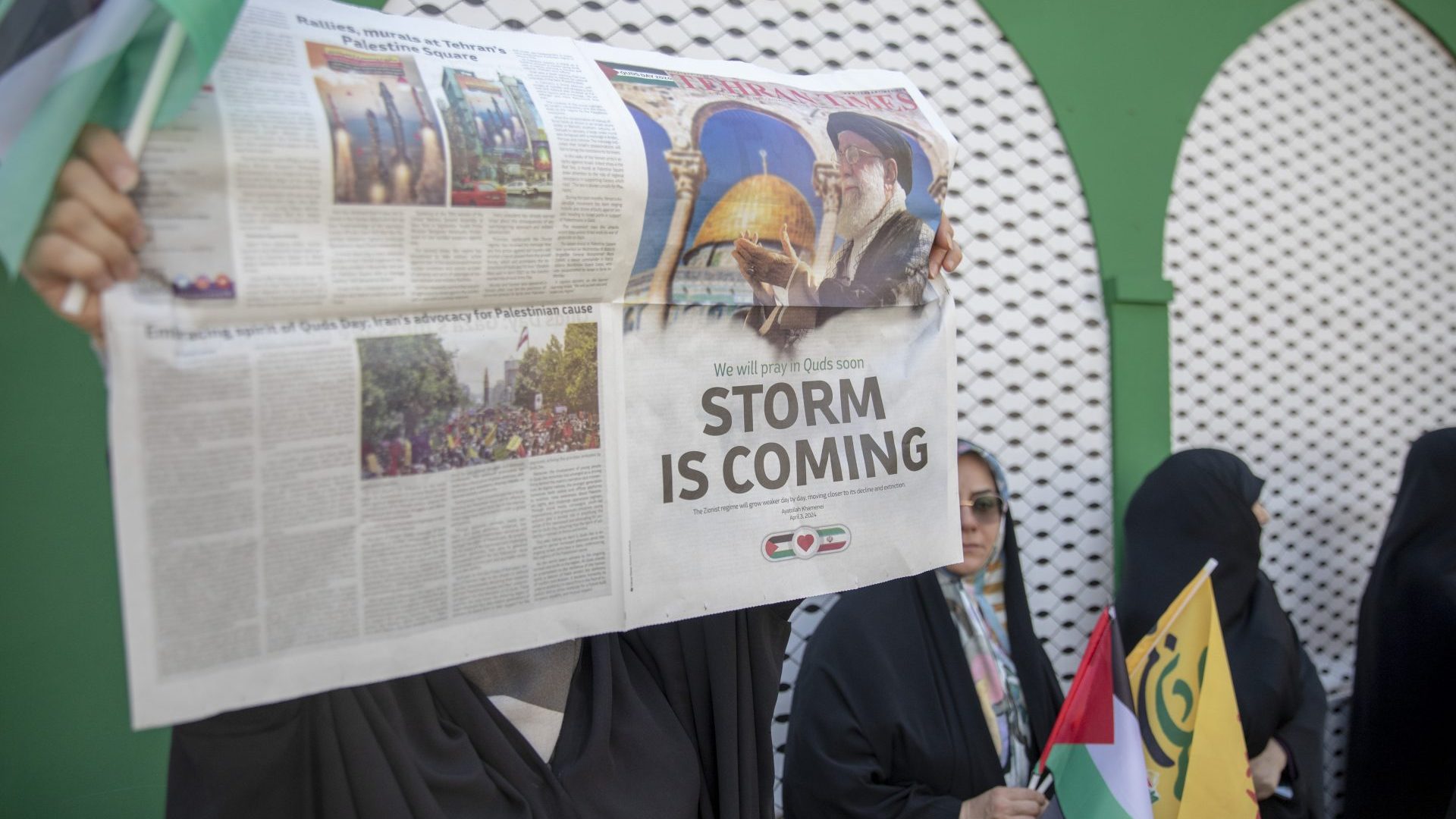According to Germany’s foreign minister, Annalena Baerbock, Iran’s unprecedented direct attack against Israel involving more than 300 projectiles has taken the Middle East to the “edge of a precipice.” Seeing the edge and seeing the violent chaos beyond may not be enough to prevent the leaders of both Israel and Iran taking us over this precipice.
Since the beginning of the conflict in Gaza, as I have previously highlighted in the New European, an escalation in the north with Iran through its proxies leading to a wider regional conflict, has been the greatest fear of leaders in both Washington and Tel Aviv. While there has been a steady escalation of attacks along the Lebanese border, Iran’s Islamic Revolutionary Guard Corps (IRGC) have claimed that it had launched the attack “in retaliation against the Zionist regime’s [Israel] repeated crimes, including the attack on the Iranian embassy’s consulate in Damascus”.
Iran’s chief of staff, Major General Mohammad Bagheri, stated that among the targets was the Notam Air Force base, from which Israeli F35s flew to conduct the strike in Syria. General Bagheri has asserted that Iran has now achieved its objective and has no intention to conduct further operations.
The attack was important for the IRGC to maintain its credibility at home and amongst its allies. During a meeting with foreign ambassadors, Iran informed the US, before last night’s attacks, that strikes against Israel would be “limited” and for self-defence. Projectiles were also fired by Iran’s proxies in Iraq, Syria, and Yemen.
Fortunately, 99% of the missiles, rockets, and drones were shot down and the 1% that got through resulted in minimal damage. Casualties from the strikes would have increased calls for retaliation.
A desire for revenge quickly follows grief. Wars begin for a multitude of reasons, but when they begin violence has its own inevitable logic. Reprisal follows attack. Grief leads to rage which leads to more grief. This demonstrates the importance of the role of the US, British, French and Jordanian air forces in helping Israel intercept the projectiles.
The decision on what Israel’s response will be will come from the country’s war cabinet, made up of Israel’s prime minister, Benjamin Netanyahu, defence minister, Yoav Gallant, and opposition leader Benny Gantz, who agreed to temporarily join Netanyahu’s government as minister without portfolio after the October 7 attacks. Before meeting on Sunday afternoon Gantz, a retired general and former chief of general staff, who fought in the First Lebanon War in 1982, said that “faced with the threat of Iran – we will build a regional coalition and collect the price from Iran, in the way and at the time that suits us.”
In 2021, Gantz described Iran as “the biggest threat to the global and regional peace and stability”. In a TV address yesterday, Netanyahu claimed, “Whoever strikes us, we will strike him.” Despite US president Joe Biden’s pleas, Israel’s war cabinet is unlikely to leave Iran’s attacks unanswered, even if their impact was limited and Iran has signalled to Israel that there will be no more attacks coming.
The options that the cabinet will have discussed, alongside building an anti-Iran coalition, will include tightly targeted missile strikes against military bases associated with Iran’s attack, but also further strikes against IRGC leaders and bases which would likely provoke further Iranian retaliation. The hawkish Netanyahu, who has the long-held goal of destroying Iran’s nuclear capability, may push even harder to use this opportunity to deal with Iran more conclusively. At a minimum, he will push the US hard to take wider sanctions and political actions against Iran in return for a smaller-scale kinetic response.
Any wider conflict would also likely delay his reckoning at the polls. Gantz has previously asked Netanyahu to name a date in September for an election. Iran’s options for further escalation include further and more sustained projectile attacks, targeting Israelis overseas, the attacking of US military bases in the region and closing the strategically important Strait of Hormuz, which almost a quarter of the world’s oil supplies pass through. The situation is an unwanted headache for Biden, who needs to focus on his own looming political battle.
It seems unlikely that either Israel or Iran will choose to follow the advice of Roman general and Stoic Marcus Aurelius, when he claimed, “The best revenge is to be unlike him who performed the injury.” Regardless of the scale of Israel’s response, the risk of miscalculation is high.
Post-October 7, the mindset in Israel has changed. The psychological scarring is deep. The state is aware of the trust deficit created by their failure to keep its people safe from Hamas.
Thousands of Israelis have fled their homes near the Lebanese border. The army must convince them it’s safe to return, and these recent attacks will not have helped them in this mission.
Over many decades, both Israel and Iran have learnt the steps for the delicate dance of escalation, that balances face-saving with your own population whilst sending careful messages of both deterrence and reassurance to each other. The two sides may now be dancing to different beats.
Over even a relatively short timeline, miscalculations are a “when” not an “if”.










